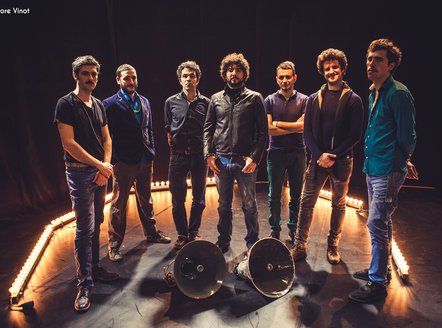Çiğdem Aslan is a singer with Alevite-Kurdish roots. Born in Istanbul, she now lives in London. But in her music she returns to the Aegean, singing folk songs from Anatolia, the Balkans and Greece. Her concert at the Hamburg International Music Festival forms part of »Big City Blues« (1–12 May 2019 at the Elbphilharmonie): the four-part series presented artists like Aslan who feel torn between two cultures. On the one hand, they adhere to the traditional styles of their musical ancestors, but on the other, they are living in the here and now, in fast-moving metropolises like London, Paris or Berlin. From these modern cities, they look back at the traditional genres – Greek rebetiko, Finnish tango, Algerian raï or Jewish klezmer – and breathe new life into them.
01
You live in London, Ms Aslan. What does London mean to you?
London, with its level of diversity, is a meeting point for many cultures and musical styles. They can communicate, create a new language together or a culture can exist on its own without any oppression on its identity. Many parts of the world are experiencing difficult times in terms of increased intolerance towards »the others«. But London is one of the few places where you feel that intolerance the least. Hopefully, it will stay like that...
02
You sing rembetiko, which is sometimes described as the »Greek blues«. How would you describe it?
Rebetiko is an urban musical genre, which reflects the lifestyle of the poor and the displaced. It describes the joy, the sorrow, the difficulties of everyday life. To quote Gail Holst, who in her book »The Road to Rebetika« describes it as follows, »What was special about the Rebetika song was the combination between traditional musical forms of the Eastern Mediterranean and the words of the songs, which dealt with the life of the urban underworld and the less reputable elements of the society.«

03
Rembetiko was mostly sung by refugees who arrived in the Greek cities at the beginning of the 20th century following the Greco-Turkish war. You once said that »Music can be home«. What do you mean by this?
Throughout the history exiled people have taken refuge in their folk music – by either singing songs or going to the places where they can listen to it. Clinging to the elements of your culture is one of the ways to deal with being away from »home«. Unfortunately, history repeats itself: what people experienced 100 years ago after the Greco-Turkish war is happening again today in Syria. Millions of refugees scattered around the world at refugee camps. I visited the refugee camp in Calais, France, and experienced first hand how familiar sounds can make people smile. I am not naïve – I know it doesn't just make everything OK. But maybe it gives people strength.
»I am not naïve – I know it doesn't just make everything OK. But maybe it gives people strength.«
Çiğdem Aslan
04
You grew up surrounded by music. Does it mean the same to you now as opposed to when you were a child?
When I was a child I was mainly exposed to Alevi music, folk songs and sometimes protest songs in Turkish or Kurdish. Later, I got to know other genres in Istanbul. I keep myself surrounded by music; the places and the times have changed, but the instinct to have music in my life hasn’t.
05
And the cities you've lived in?
Yes, Istanbul, London... All the cities that I've lived have influenced me. Meeting new people from different backgrounds, hearing their stories, different climates, different daily routines, various musical experiences; these have all contributed positively to my performance.
»Big City Blues« at the Elbphilharmonie
- Elbphilharmonie Kleiner Saal
Big City Blues / Sofiane Saidi & Mazalda
Hamburg International Music Festival
Past Concert - Elbphilharmonie Kleiner Saal
Hamburg International Music Festival
Past Concert - Elbphilharmonie Kleiner Saal
Hamburg International Music Festival
Past Concert - Elbphilharmonie Kleiner Saal
Big City Blues / Daniel Kahn and The Painted Bird
Hamburg International Music Festival
Past Concert










